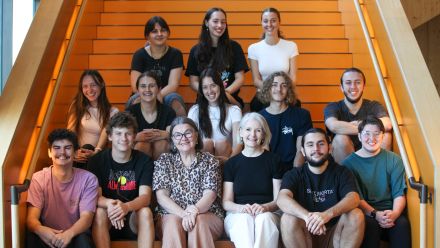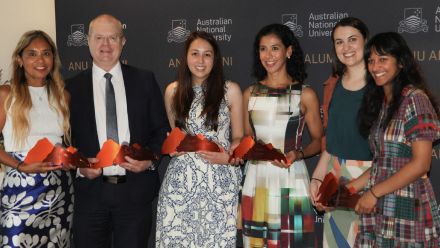ANU women challenging the patriarchy in their fields
Gender-responsive and age-sensitive adaptation efforts need to be developed from local priorities, cultures, geography and economies.
Updated: Monday 21 March 2022
This International Women's Day (IWD) we are celebrating four ANU women who are challenging patriarchy in their respective fields.
Professor Karima Laachir, Director of the ANU Centre for Arab and Islamic Studies, works to increase public awareness around gender and sexual politics in the Middle East and the Arabic speaking world.
For decades, women in these regions have suffered from the ravages of conflicts and civil wars that have exacerbated acts of gendered-based violence within their communities.
However, many women in these regions are strongly resisting patriarchal structures of domination and discriminatory state laws. They are doing so by actively participating and shaping the futures of their nations through civil society activism, grassroots feminist movements, and political mobilisation.
"Their voices are diverse and heterogonous, and attest to their agency and resilience," Karima says.
Challenging patriarchal structures in the Gulf
Dr Jessie Moritz from the ANU Centre for Arab and Islamic Studies researches the impact of oil and gas wealth on domestic politics and economic development in the Arabian Peninsula.
Her research suggests that although countries within the Gulf Cooperation Council are among the world's largest carbon emitters, they are exceptionally vulnerable to the environmental impacts of climate change.
Jessie says Gulf women are ready to play a role in policymaking, economic transformation and energy security to create lasting change within their communities.
"There are real opportunities for women in the Gulf to play a central role in shaping the economic transformation projects that must occur for countries such as Saudi Arabia to move away from oil and gas dependence," Jessie says.
There is still work to be done, she says.
"The highly talented women who are placed into ministerial or similar positions of power have still generally been limited to the 'softer' portfolios - culture and heritage, gender, education - or placed into highly visible diplomatic positions overseas, suggesting their position is at least partially about image-making/branding," Jessie says.
Jessie says women's participation in traditionally patriarchal spaces will be crucial to the long-term success of the climate transition in these geopolitically-critical energy producing countries.
Advocating the power of women in the Middle East
Dr Raihan Ismail from the Centre for Arab and Islamic Studies researches women's agency in the Middle East. She seeks to understand, address and correct misperceptions about women in the region.
"From political activism to community organisation to fighting environmental degradation, there are women in the Middle East who are resilient, politically adept and leaders in their communities," Raihan says.
Women and girls are facing greater vulnerability and exposure to disasters, conflicts, and crises than men because they are structurally disadvantaged by autocratic regimes and global inequality, she says.
"In conflict areas, violence against women and girls is used as a weapon by state and non-state actors to subdue and repress communities, making them more vulnerable," Raihan says.
Raihan is using her work to highlight the power and agency of Middle Eastern women in challenging patriarchal structures.
"Challenges cannot be understated, especially in conflict areas, but many women and girls rise up to the challenge to create a safer environment for themselves and their communities," she says.
Women & girls are frontline responders too
For Professor Bina D'Costa from the Department of International Relations at ANU, this year's International Women's Day message is personal.
"Coming from a war-torn country and region that have been ravaged by cyclones, floods, droughts, famine, and is now facing incredible danger because of sea level rise, I am acutely aware of the disproportionate impacts of wars, displacement, and climate change on women and girls," Bina says.
"They are on the frontlines of these crises, globally. They are also the frontline responders, locally and globally."
Bina's research focuses on humanitarian emergencies, child protection, gender justice and the human rights of refugees.
"Almost without any exception, refugee camps and settlements are places which bear the brunt of environmental impacts, deforestation, acute water shortage and hunger. Women and girls face increased protection risks in such contexts," she says.
Rather than only emphasising women and girls as victims, Bina's research reveals that recognising their contribution to adapting, mitigating and responding to our ever-changing planet is invaluable.
"While we learn from each context, some measures won't work everywhere," she says.
"Gender-responsive and age-sensitive adaptation efforts need to be developed from local priorities, cultures, geography and economies."
Driving change through advocacy
Dr Virginia Marshall is a Wiradjuri Nyemba woman, lawyer and scholar working in Indigenous policy and law reform. Virginia says one of the greatest vulnerabilities for women and girls is "when we intellectualise their despair, their pain and their suffering".
"Climate collapse, war, conflict and disasters undermine human dignity and the safety of women and girls," she says.
For Virginia, advocacy in human rights and Indigenous policy and law reform is instrumental to advancing structural change for women and girls.
"Indigenous-led research and implementing Indigenous-informed recommendations empowers and promotes equity and inclusion," she says.
Combatting women's financial disadvantage
Anthropologist Dr Caroline Schuster says society faces a problem of measuring and recognising women and girls' economic contribution when we take aim at developing sustainable solutions for a healthy planet.
"Women and gender diverse people are often relegated to the outskirts of financial services, and when targeted specifically for inclusion, it's often on poor or even exploitative terms," Caroline says.
This International Women's Day, Caroline is spreading the message that we need to tackle the origins and ongoing effects of uneven financial development among men and women.
Recognising the transformative potential of women leaders
International relations expert Dr Maria Tanyag says society needs put more value on women's unpaid care labour and resource care institutions that sustain households and communities before, during and after any crisis.
"Women are denied spaces in decision making because they do not conform to expectations of who the 'expert' is or how 'expertise' should look like," says Maria, who was a contributing author to the 2020 United Nations Environment report, Gender, Climate & Security.
She says women are disproportionately impacted by crises, in large part, because of gendered divisions of labour and the ways in which access to health, especially sexual and reproductive health, are egregiously denied to them.
"When women cannot make decisions over their own health and well-being especially during times of crisis, it is very difficult for them to equally contribute to other areas of political and economic decision-making," Maria says.
The path to a more sustainable, peaceful and healthy planet is one where women's health and bodily autonomy are promoted, she argues.
"If we really want to see diverse groups of women leaders, we have to be equally prepared to embrace the radical alternatives they'll offer."


